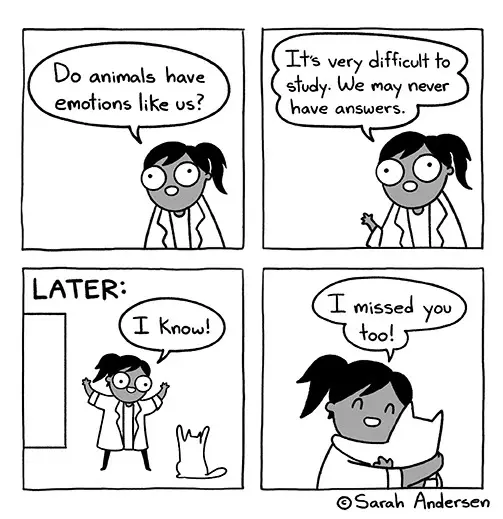Do animals have emotions like us?
Do animals have emotions like us?


Do animals have emotions like us?


You're viewing a single thread.
They don't have emotions like us but they have emotions similar to ours.
How would you define like us vs similar to us?
Same same, but different.
Lol if you meant to invoke the thought of Korean culture vs. American as an example, I think it worked!
Humans can have more complex emotions. We can be stressed about theoretical concepts that animals just are not equipped to understand. We can be excited by the prospect of future events.
Most animal emotions are immediate. They enjoy some food they eat, they find a nice warm spot to bask in, they see a predator and run away. Most animals lack the mental capacity to think beyond the immediate.
I mean, that could just be a fault in observation. The same line of thinking was utilized by people like Thomas Jefferson to validate his own use of slavery.
The language we use to describe intellect and emotions are inseparable from biased interpretation by humans. Can all humans "stress about theoretical concepts"? If a human lacks the ability to do so, do they become less human, or more animalistic?
Pretty sure every human who understands the concept of death are stressed about it at some point in their life.
So, those who do not understand the concept would probably not stress over it. Like someone with brain damage, or animals I guess.
Who knows, maybe my cat is in a bad mood sometimes because she is having an existential crisis, but I kinda doubt it.
Pretty sure every human who understands the concept of death are stressed about it at some point in their life.
Right, but how does one express their anxiety over the concept of death? And if someone does not express their anxiety in a perceivable way, does that mean they do not experience it?
If we took away a person's ability to vocalize their grievances, what kind of behavior of theirs would we attribute to an existential crisis? And how would we determine that type of anxiety from normal interaction with the external environment?
Pretty hard to argue against radically different biological design between our brains. There are animals who can be more emotionally nuanced than humans, like elephants, but for pets those emotions are generally more basic and more extreme. Yes, humans can be psychopaths and sociopaths.
Pretty hard to argue against radically different biological design between our brains.
I don't really see the argument.... For one, all mammals share fairly similar brain structures, with the main difference being the over or under development of particular regions of the brain.
However, even if we accept the claim that they are "radically different". A mere difference in brain structure does not preclude the ability to have complex emotions.
Yes, humans can be psychopaths and sociopaths.
I'm not sure if that's really relevant, sociopathy and psychopathy are defined by the subjects inability to conform to social mores. These terms cannot definitionally be applied to animals. However, there are plenty of examples of animals being shunned by their social groups, or animals who choose to stray from their social norms.
I'm not claiming animals share the same emotional capabilities as humans, but it's unscientific to claim that they are incapable of complex emotions based on the evidence presumed in this thread.
Imo there's been a bit of an overcorrection in science when it comes to trying to curb anthropomorphizing. And a lot of that is due to people like Thomas Nagel, who have a vested interest in stripping animals of terms like consciousness.
If that's the case, then there's also something more complex going on - animals can certainly learn to anticipate things at specific times, like food, a dog gets excited by a doorbell because they knew that means somebody is coming, they can get stressed out by innocuous things if they associate it with bad experiences like beatings.
Not saying you're wrong, but it warrants further explanation, because as is it doesn't match the simple experience of living with a dog.
Proof?
I can't answer your question, but I assume that "like" and "similar to" are neither like nor similar to each other